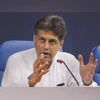Congress MP Manish Tewari on Tuesday submitted a formal notice to oppose the introduction of the Constitution (One Hundred and Twenty-Ninth Amendment) Bill, 2024, in the Lok Sabha.
The bill, which aims to implement the 'One Nation, One Election' proposal, is scheduled to be introduced by Union Law Minister Arjun Ram Meghwal on Tuesday.
Tewari, in his notice addressed to the Secretary-General of the Lok Sabha under Rule 72 of the Rules of Procedure, expressed strong objections to the bill, calling it a threat to India's federal structure and democratic principles.
"My objections to the proposed Bill are based on serious concerns regarding constitutionalism and constitutionality," he stated.
Raising his first concern, Tewari said the bill violates India's federal character as defined in Article 1 of the Constitution. "The Constitution (One Hundred and Twenty-Ninth Amendment) Bill, 2024, which proposes simultaneous elections for the Lok Sabha and State Assemblies, directly challenges this federal framework by imposing uniformity across states. Such a move risks eroding state autonomy, diminishing local democratic engagement, and centralising power, thereby undermining the pluralism and diversity that are cornerstones of India's democratic ethos."
Tewari also warned that implementing simultaneous elections would require amending Articles 83 and 172, which guarantee the fixed tenure of legislative bodies. He argued that such changes violate the basic structure doctrine of the Constitution, as established in the landmark Kesavananda Bharati judgment.
"The proposed insertion of Article 82A in the Constitution to facilitate simultaneous elections necessitates the premature dissolution of State Assemblies... This move contravenes the basic structure doctrine established by the Supreme Court... By undermining the federal character of governance and enforcing uniformity, the Bill violates core elements of the basic structure, including federalism, separation of powers, and the republican and democratic framework," Tewari noted.
Also Read
The Congress MP also expressed concern that the bill could weaken state governments by centralising electoral processes. "The Bill undermines the authority of elected state governments, weakens grassroots democracy, and encroaches on the autonomy of local governance," he said.
Tewari further pointed out the risk of prolonged President's Rule under Article 356 if state governments are dissolved prematurely. "The potential for extended periods of President's Rule risks entrenching central control, thereby eroding the foundational principles of federalism.
(Only the headline and picture of this report may have been reworked by the Business Standard staff; the rest of the content is auto-generated from a syndicated feed.)
)